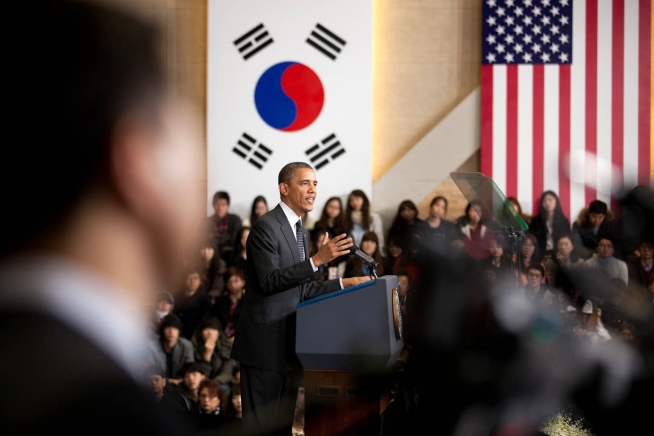 United States President Barack Obama kicks off a visit to Japan, South Korea, Malaysia and the Philippines today, during which he’ll seek to convey strong US support for allies and commitment to the Asia Pacific without derailing the US–China relationship.
United States President Barack Obama kicks off a visit to Japan, South Korea, Malaysia and the Philippines today, during which he’ll seek to convey strong US support for allies and commitment to the Asia Pacific without derailing the US–China relationship.
That’s a big ask, given the anxiety and scepticism about the strength of US engagement, and the array of tensions in the region at present. Of the countries he’s visiting, Japan and the Philippines now have particularly thorny relations with China. Beijing recently charged that both states are emboldened in their respective territorial disputes with China because they’re US allies; conversely, some in Washington worry that Tokyo’s and Manila’s concerns about US reliability could lead them to act unilaterally to shore up their security.
Tokyo is especially nervous about US steadfastness, and is looking for a strong avowal of the US commitment to its treaty obligations. For its part, Seoul wants the US to maintain wartime operational control on the Korean peninsula beyond the agreed 2015. Some South Korean officials fear that transfer of control to South Korea, which the US seeks, might herald a lesser US commitment and encourage North Korean aggression.
Meanwhile, Japan-South Korea relations have become neuralgic, with deep-seated historic grievances playing out at the leaders’ level. While Washington has worked hard to promote a slight thaw, the icy relationship between two of its allies has inhibited US efforts to mount a trilateral front on North Asian security issues.
Even in Malaysia, where Obama will highlight the deepened US–Malaysia economic relationship and US focus on Southeast Asia, he’ll face the diplomatic complexity of the Malaysian aircraft search, including the strained China-Malaysia relationship.
The President will seek to demonstrate that the rebalance is alive and well by pointing to closer ties with allies, including the striking turnaround in the US-Philippines relationship, from the US being kicked out of Subic Bay in the 1990s to now nearing agreement on an expanded US military presence.
He can also point to strengthened engagement with other Southeast Asian states, including Singapore and Vietnam, and heightened support for regional institutions such as the East Asia Summit and the ASEAN Defence Ministers’ Meeting Plus. The Pentagon has expanded its regional military training and exercise program to involve more countries, with a focus on increasing cooperation on humanitarian assistance and disaster relief. Defence Secretary Chuck Hagel has been particularly active having just made his fourth visit in a year to the region. He has also just hosted the inaugural US–ASEAN Defense Forum, a meeting of the defence ministers of all 11 nations. And Hagel’s tour of the Chinese aircraft carrier while in China only reaffirmed the extraordinary capability edge the US maintains over all other militaries in the region.
So President Obama has more to tout on this trip than some skeptics allow. Nevertheless, throughout the visit he’ll have to contend with a growing discussion about US weakness and possible retrenchment from the region. One part of this discussion involves the US response to global crises. Syria has highlighted a US reluctance to act, and Ukraine has reinforced the contention that the US is distracted by pressing events elsewhere. Certainly, Secretary of State John Kerry has spent more time hewing at the rocks of Iran and the Middle East peace process than he has visiting Asia.
Another part is domestic, namely a polarised Congress and its dysfunctional relationship with the executive branch, which is limiting Obama’s ability to further the national interest abroad. This Asia trip itself is a revised version of a visit planned for last October that was cancelled due to the US government shutdown. The President missed last year’s APEC and East Asia Summit as a result, and US credibility as a regional leader was damaged.
The Administration had hoped to showcase its regional leadership on this upcoming trip with a near complete Trans-Pacific Partnership, the economic centrepiece of the rebalance. But the TPP has stalled: Congress has been unwilling to grant the President fast-track negotiating authority in a congressional election year, depriving US negotiators of leverage needed in tough bilateral negotiations, such as those with Japan.
Finally, Congress has presided over the remarkably blunt instrument to cut spending that is sequestration. The defence spending cuts are damaging force readiness and the US military’s ability to meet the demands of the rebalance, as well as the full suite of US global responsibilities. While a number on both sides of Congress now acknowledge sequestration is hurting national security, they haven’t been able to agree on repealing or ameliorating it.
President Obama will be working hard to counter this narrative of US weakness, reassert authority, and reassure allies while not rattling China. It’s a complex set of messages. All eyes will be on the President to see how he calibrates them.
Elsina Wainwright is a visiting senior fellow at the Center on International Cooperation, New York University. Image courtesy of White House.

